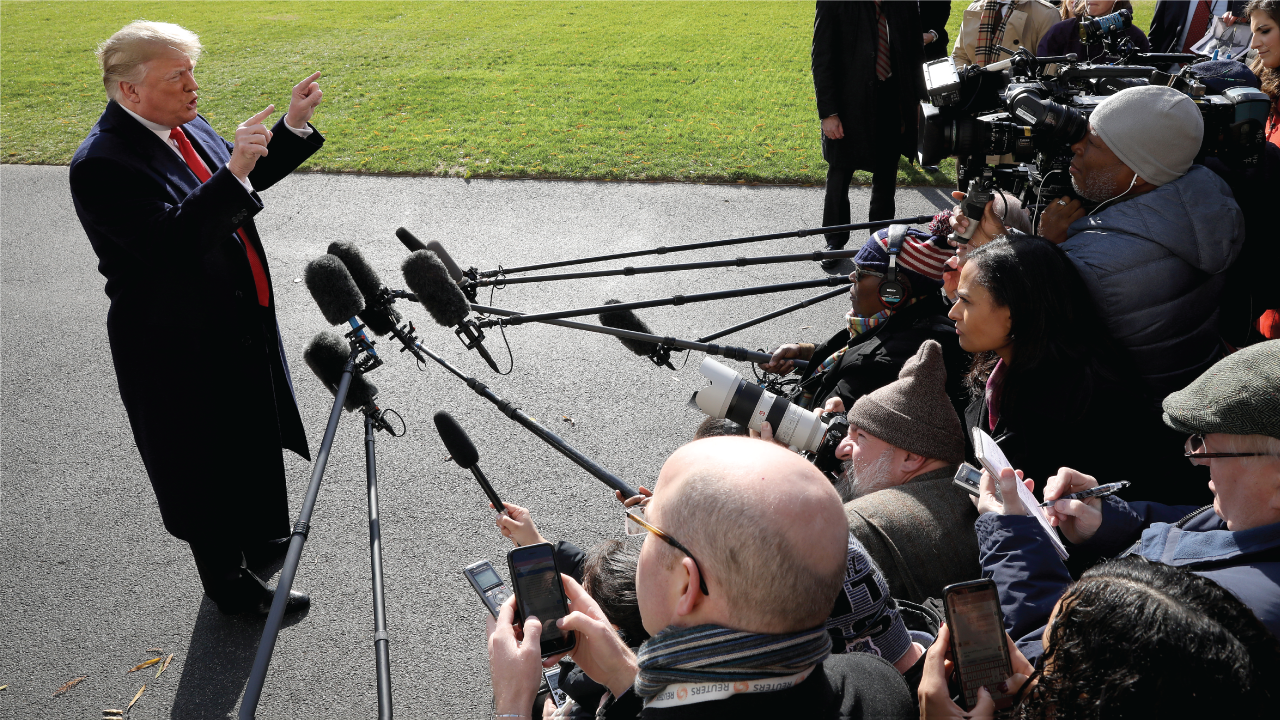
President Trump answers questions from reporters outside the White House in November 2018. (Win McNamee/Getty Images)
It is no secret that, in an information environment characterized by deep tensions between President Donald Trump and national news organizations, Americans are divided in their trust of the news media. A new Pew Research Center exploration of more than 50 different surveys conducted by the Center – combined with an analysis of well over 100 questions measuring possible factors that could drive trust in the news media – confirms that in the Trump era nothing comes close to matching the impact of political party identification. On item after item, Republicans consistently express far greater skepticism of the news media and their motives than Democrats, according to this analysis that focuses on trust in the news media during 2018 and 2019.
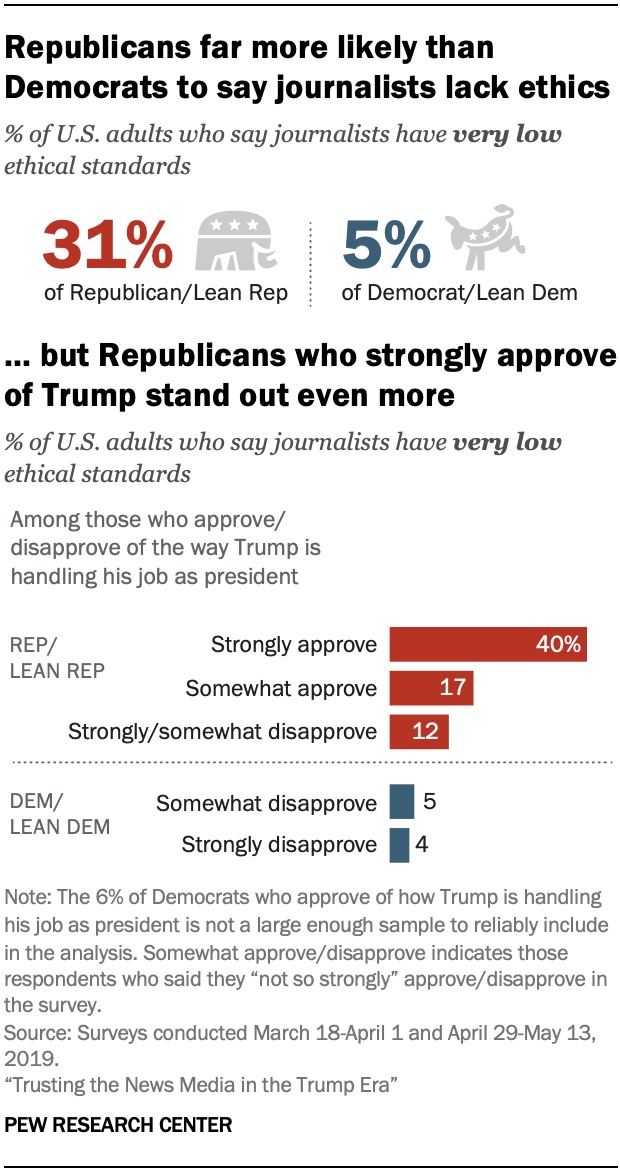 Even
more telling, the analysis reveals that divides emerge within party –
particularly the Republican Party – based on how strongly people approve
of Trump’s performance as president. Trump has publicly and repeatedly
criticized both news organizations and the journalists who work for
them, criticisms that, according to this study, resonate with his most
fervent supporters.
Even
more telling, the analysis reveals that divides emerge within party –
particularly the Republican Party – based on how strongly people approve
of Trump’s performance as president. Trump has publicly and repeatedly
criticized both news organizations and the journalists who work for
them, criticisms that, according to this study, resonate with his most
fervent supporters. The link between the public’s approval of Trump and views of the news media is clear in evaluations of journalists’ ethics. About three-in-ten Republicans and Republican-leaning independents (31%) say journalists have very low ethical standards, roughly six times the 5% of Democrats and Democratic leaners who say this. Trump’s strongest approvers, though, express even greater suspicion: 40% of Republicans who strongly approve of Trump’s job performance say journalists’ ethics are that low. That is true of far fewer Republicans who only somewhat approve of Trump or disapprove of him: 17% and 12%, respectively.1
Overall, this relationship between support for Trump and depressed trust in the news media persists over a range of attitudes. And, taken together, Republicans who are most approving of Trump and Democrats who are least approving of him stand far apart from each other.
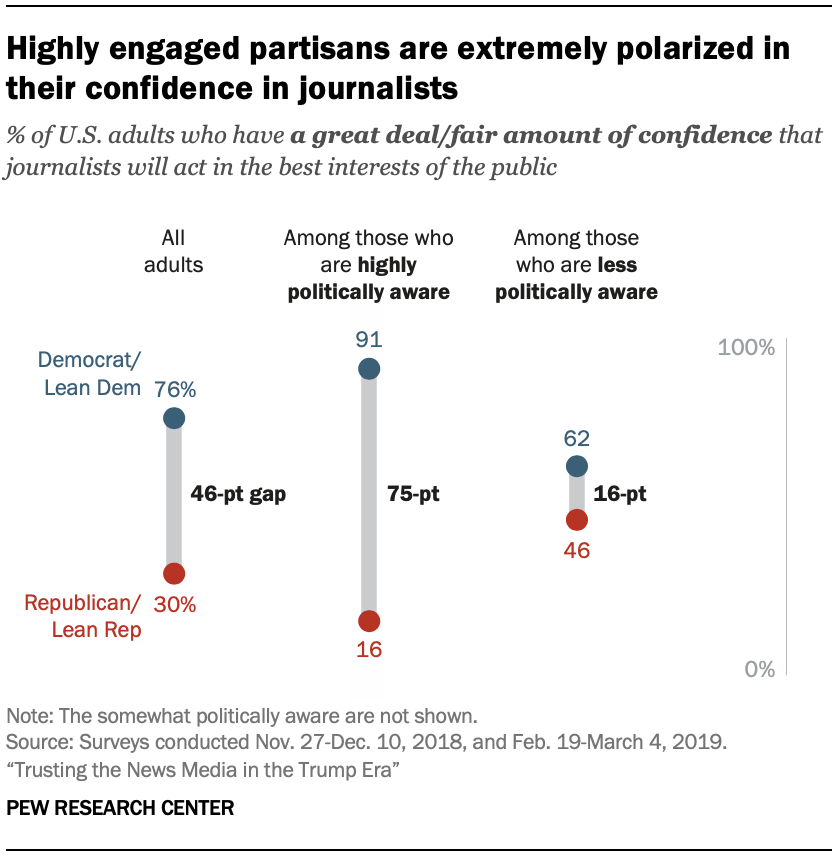 The
extent to which a person is engaged with national politics and the news
surrounding it also plays into their evaluation of the news media.
Highly engaged partisans are even more polarized in their views than the
two parties overall. For example, there is a 46 percentage point gap
between all Democrats and Republicans (including those who lean to each
party) in whether they have a great deal or fair amount of confidence
that journalists will act in the best interests of the public. This
jumps to a 75-point gap between the highly politically aware who
associate with the two parties (91% of highly politically aware
Democrats vs. 16% of highly aware Republicans).
The
extent to which a person is engaged with national politics and the news
surrounding it also plays into their evaluation of the news media.
Highly engaged partisans are even more polarized in their views than the
two parties overall. For example, there is a 46 percentage point gap
between all Democrats and Republicans (including those who lean to each
party) in whether they have a great deal or fair amount of confidence
that journalists will act in the best interests of the public. This
jumps to a 75-point gap between the highly politically aware who
associate with the two parties (91% of highly politically aware
Democrats vs. 16% of highly aware Republicans). No other factors in this study come close to these partisan dynamics in their relationship to Americans’ views. There are a few that show some connection, however. One of these factors is trust in others more generally, or interpersonal trust: Americans who express greater trust in others tend to give the news media higher marks than those who are less trusting. Additionally, there are some interesting differences across demographic groups, such as those based on age, race and ethnicity, religion, and education. For example, black Americans often exhibit greater support of news organizations and journalists than Hispanic or white Americans. And older Americans are more loyal to their preferred news sources than younger Americans. Other concepts such as life cycle milestones and life satisfaction measures show limited, inconsistent or no relationship with evaluations of the news media.
The overall goal of this study was to integrate a wide range of concepts to develop a comprehensive understanding of the factors that link to the public’s trust in the news media today. Researchers pulled together years of Pew Research Center surveys conducted on the American Trends Panel and examined responses from the panel members across these surveys. Using advanced statistical weighting and multivariate analyses, attitudes toward the news media – including direct measures of trust as well as closely related measures – were set alongside a wide range of other measures to examine what connects to trust in the news media.
Highly engaged partisans have starkly different views of the news media
The public’s level of engagement – both politically and with the news – adds another dimension to partisans’ evaluations of the news media. Divides within the parties once again emerge, and partisans who are highly engaged are the most polarized in a range of views of the news media.
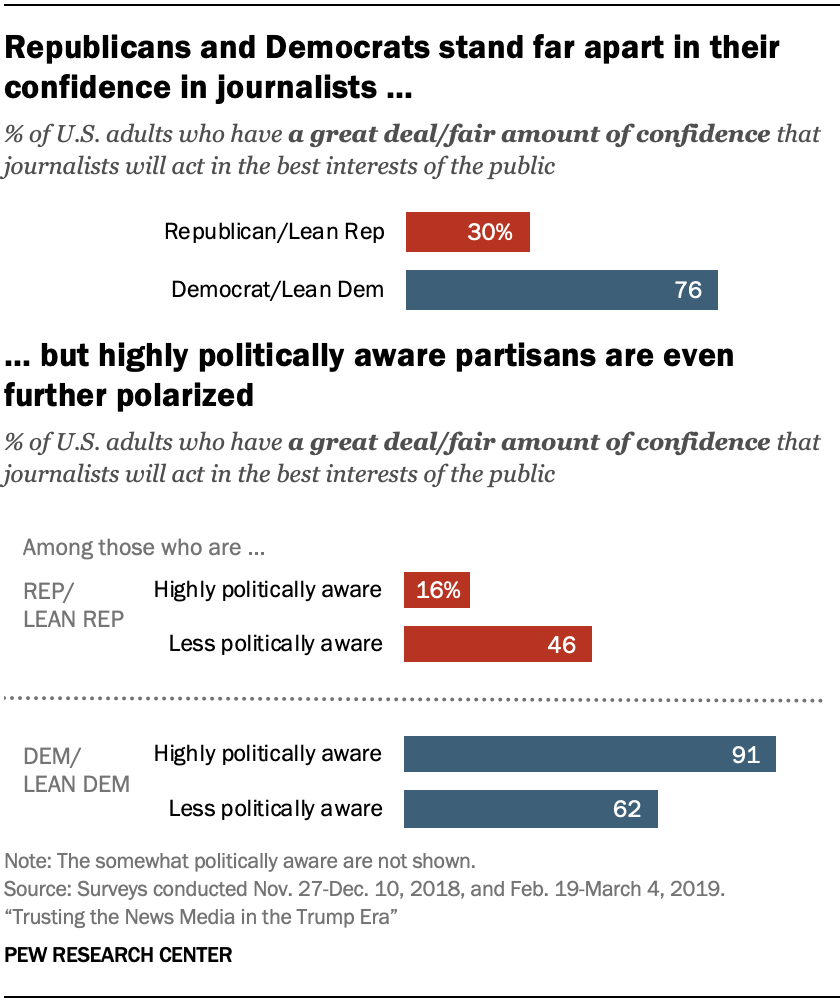 In
general, Republicans and Republican leaners who are highly engaged with
politics or with the news tend to be more negative toward the news
media than less engaged Republicans, and highly engaged Democrats and
Democratic leaners are typically more supportive of the news media than
their less engaged counterparts. Taken together, stark divides emerge
between the highly engaged Republicans and Democrats – divides that are
often more pronounced than among partisans overall.5 (For more information on the two measures of engagement – political awareness and news engagement – see the box below.)
In
general, Republicans and Republican leaners who are highly engaged with
politics or with the news tend to be more negative toward the news
media than less engaged Republicans, and highly engaged Democrats and
Democratic leaners are typically more supportive of the news media than
their less engaged counterparts. Taken together, stark divides emerge
between the highly engaged Republicans and Democrats – divides that are
often more pronounced than among partisans overall.5 (For more information on the two measures of engagement – political awareness and news engagement – see the box below.) For example, Americans’ level of confidence that journalists will act in the best interests of the public clearly shows how partisan divides are even starker among the highly engaged. In this case, the two parties begin with quite different levels of confidence – 30% of Republicans versus 76% of Democrats overall have a great deal or fair amount of confidence. But then looking within party, highly politically aware Republicans are 30 percentage points less likely than less aware Republicans to say this (16% vs. 46%). And highly aware Democrats are 29 points more likely than their less aware counterparts to express this level of confidence (91% vs. 62%).
Across parties, though, the divide between highly engaged Republicans and Democrats is far larger. The 46 percentage point gap between Republicans and Democrats overall increases to 75 points. A similar pattern emerges when looking at news engagement: There is a 66 percentage point difference between Republicans and Democrats who are highly engaged with news (23% vs. 89%, respectively).
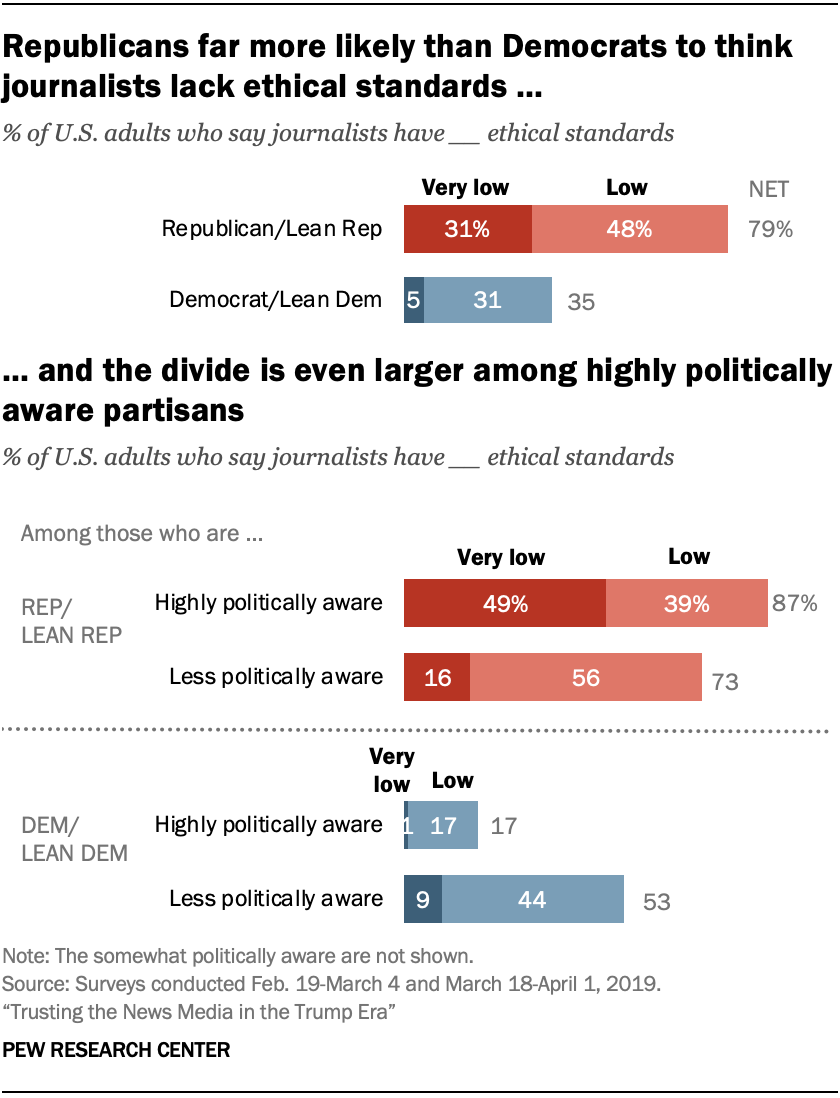 The
highly and less engaged in each party are similarly divided in their
views of journalists’ ethics. Highly politically aware Republicans are
14 percentage points more likely than those who are less engaged to
think that journalists have low or very low ethics (87% vs. 73%) – a gap
that is 33 points when considering only those who say very low (49% vs.
16%). And among Democrats, there is a 36-point difference between the
highly and less politically aware who say journalists have low or very
low ethics (17% vs. 53%).
The
highly and less engaged in each party are similarly divided in their
views of journalists’ ethics. Highly politically aware Republicans are
14 percentage points more likely than those who are less engaged to
think that journalists have low or very low ethics (87% vs. 73%) – a gap
that is 33 points when considering only those who say very low (49% vs.
16%). And among Democrats, there is a 36-point difference between the
highly and less politically aware who say journalists have low or very
low ethics (17% vs. 53%). As with confidence, there is again a substantial divide between highly engaged partisans. The 44-point gap between Republicans and Democrats overall in their view of whether journalists have low or very low ethical standards grows to 70 points between the highly politically aware Republicans and Democrats. And again, a similar pattern emerges among Republicans and Democrats who are highly engaged with news.
On the other measures of trust analyzed in this study, there are also large divides between highly engaged Republicans and Democrats on their trust in the information from national news organizations, views of the media’s watchdog role, and perceived fairness in coverage.6 These stark divides between highly engaged Republicans and Democrats are in line with previous studies that show large divides in political attitudes between the most engaged partisans.
How we measure engagement
Partisans have similar levels of loyalty to their sources of news
While there are profound political divides in Americans’ views of the news media and journalists generally, partisanship is less connected to the public’s sense of loyalty to their own individually preferred sources of information – that is, those sources they tend to rely on most. Instead of stark divides, the most fervent partisans – Trump’s strongest approvers and detractors as well as those who are highly engaged with politics or with the news – are much more on par in their sense of loyalty and tend to be more loyal than their less fervent counterparts.
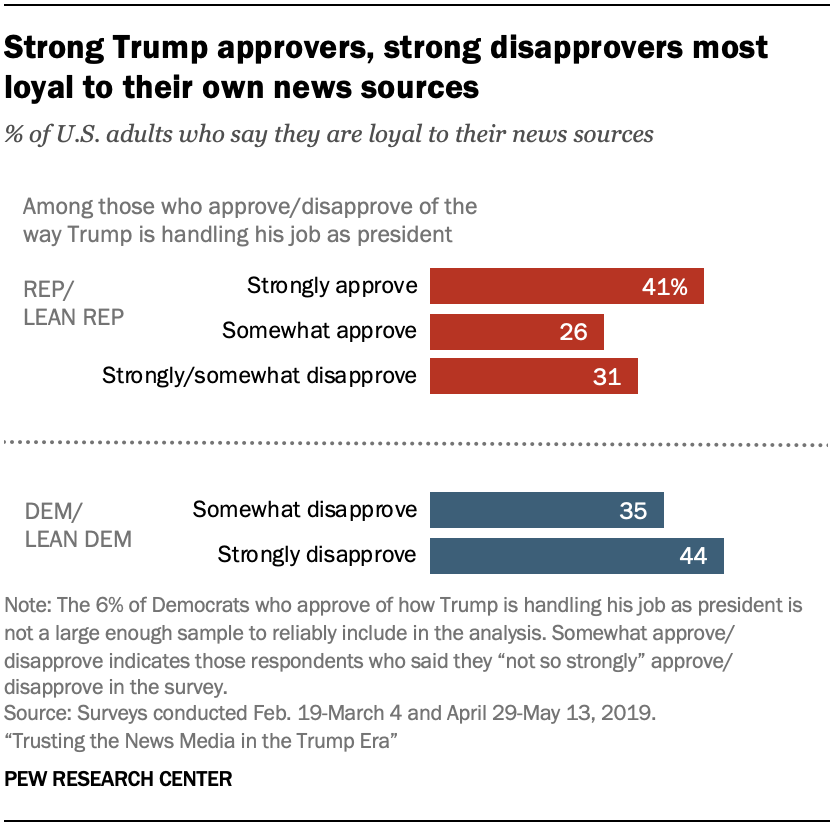 Republicans
and Republican leaners who strongly approve of how Trump is handling
his job as president feel more loyal to their news sources than those
who somewhat approve or disapprove (41%, vs. 26% and 31% respectively).
Likewise, strongly disapproving Democrats and Democratic leaners also
feel more loyal than somewhat disapproving Democrats (44% vs. 35%).
Taken together, the most approving Republicans and the least approving
Democrats are about on par in their loyalty to their own news sources.
Republicans
and Republican leaners who strongly approve of how Trump is handling
his job as president feel more loyal to their news sources than those
who somewhat approve or disapprove (41%, vs. 26% and 31% respectively).
Likewise, strongly disapproving Democrats and Democratic leaners also
feel more loyal than somewhat disapproving Democrats (44% vs. 35%).
Taken together, the most approving Republicans and the least approving
Democrats are about on par in their loyalty to their own news sources. 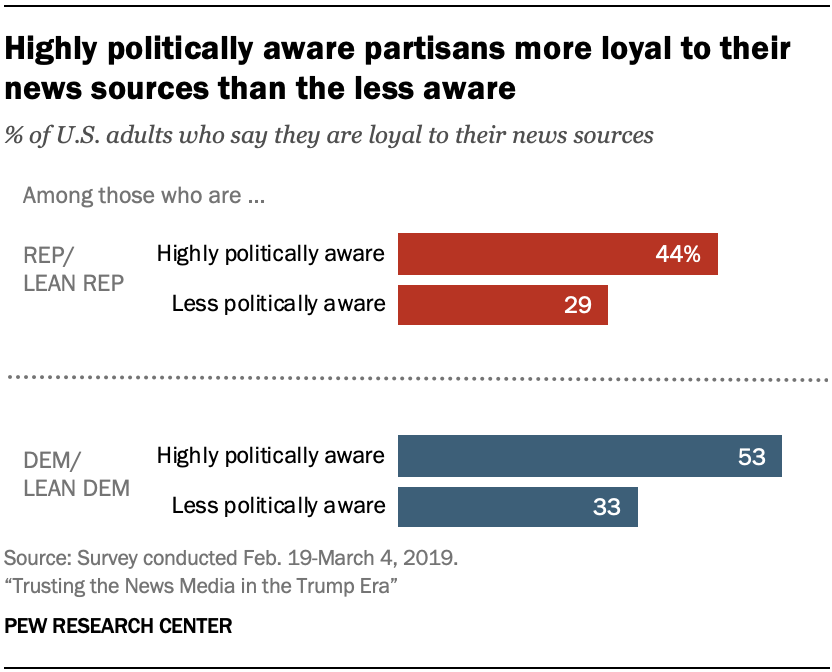 The
highly engaged in each party – whether with politics or with the news –
feel more loyal to their news sources than their less engaged
counterparts. For instance, about half of the highly politically aware
(49%), say they are loyal to their sources of news, 18 percentage points
higher than the less aware (31%) – a pattern that is evident within
both parties. Highly politically aware Republicans are 15 points more
likely than less aware Republicans to feel loyal to their news sources,
and highly aware Democrats are 20 points more likely than less aware
Democrats. Again, the same pattern exists with the other measure of
engagement – engagement with the news.
The
highly engaged in each party – whether with politics or with the news –
feel more loyal to their news sources than their less engaged
counterparts. For instance, about half of the highly politically aware
(49%), say they are loyal to their sources of news, 18 percentage points
higher than the less aware (31%) – a pattern that is evident within
both parties. Highly politically aware Republicans are 15 points more
likely than less aware Republicans to feel loyal to their news sources,
and highly aware Democrats are 20 points more likely than less aware
Democrats. Again, the same pattern exists with the other measure of
engagement – engagement with the news.Factors beyond party affiliation also connect with trust in the news media
Other factors beyond partisan dynamics are linked with Americans’ assessments of the news media – though perhaps not as dramatically. Two additional areas stand out in this analysis: trust of others overall and demographic characteristics.
Americans who are more trusting of others overall extend that trust to the news media
High trusters – those with high levels of trust in others overall – are more likely than low trusters – those with lower levels of trust in others – to trust the information they get from national news organizations, think that journalists are ethical, have confidence in journalists to serve the public good, and feel loyal to their own sources of news. (For more information on the measures of personal trust, see the box below.)
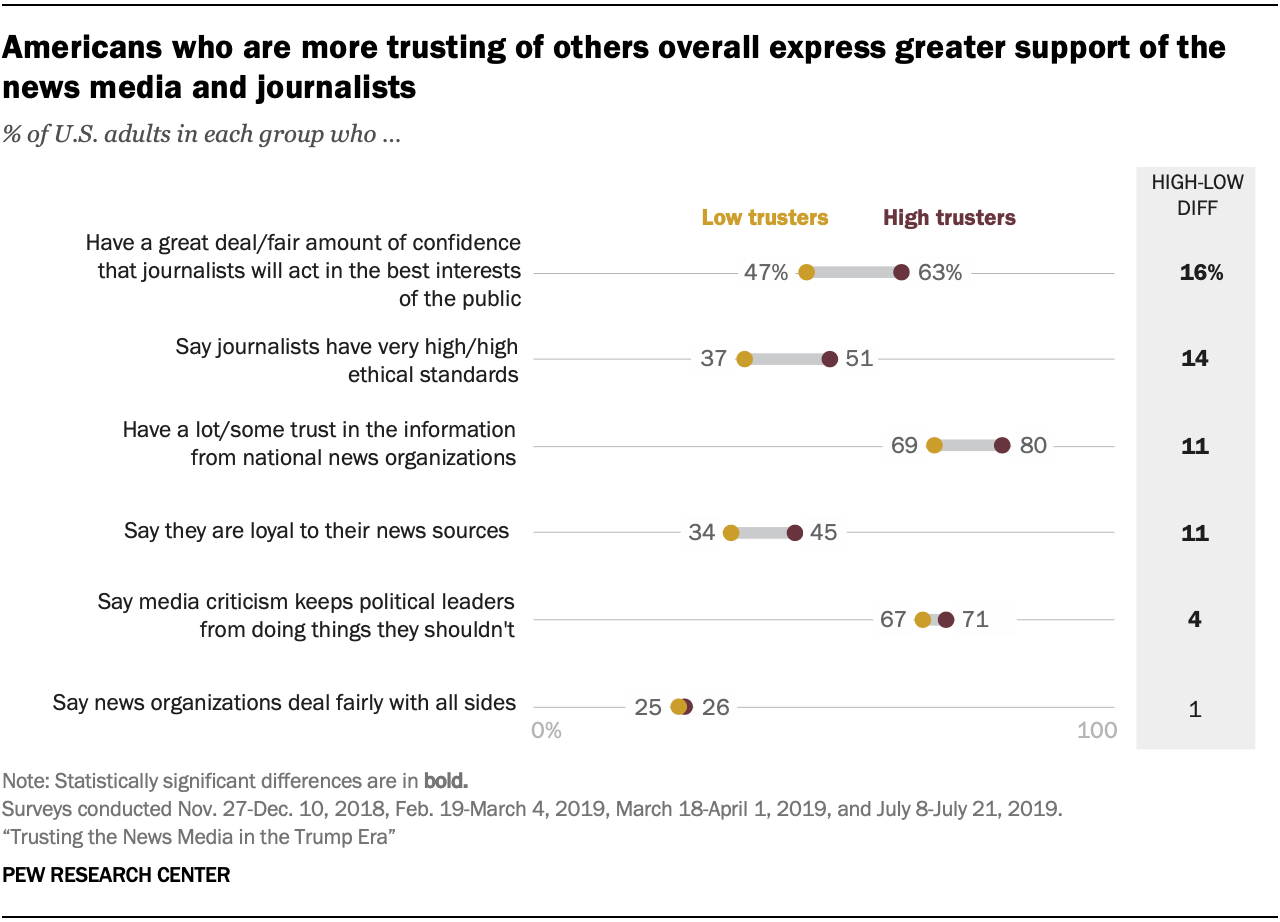
For example, high trusters are 16 percentage points more likely to have a great deal or fair amount of confidence in journalists to act in the best interests of the public (63% vs. 47%, respectively). Similarly, high trusters are 14 points more likely than low trusters to say that journalists have very high or high ethical standards (51% vs. 37%). These findings are in line with previous Pew Research Center studies showing that high trusting individuals tend to be more supportive and confident in a range of institutions.
How we measure personal trust
Americans’ level of personal trust has less connection with their view of the news media’s watchdog role or their likelihood to say news organizations are fair in their coverage of political and social issues, however.
Demographics and trust in the news media
The survey data used in this analysis highlights several interesting differences by race and ethnicity, age, educational attainment, urban-rural residency and religion. Below is a summary of some of the demographic findings. For more details, see the Appendix.
Black Americans generally have higher support for and trust in the news media than Hispanic Americans and especially white Americans. For example, 57% of blacks say journalists have high or very high ethical standards compared with 49% of Hispanics and 41% of whites. Also, 41% of black adults say news organizations are fair to all sides when covering political and social issues, 10 points higher than Hispanics (31%) and 19 points higher than whites (22%).
Older Americans tend to feel more connected to their preferred news sources than younger Americans. About half of those ages 65 and older (49%) feel loyal to their news sources, compared with about a quarter of 18- to 29-year-olds (27%), a difference of 22 percentage points. Those ages 30 to 49 and 50 to 64 fall somewhere in between (36% and 44%, respectively).
U.S. adults with higher levels of education express greater trust in information from national news organizations than those with less education. For instance, those with a college degree or higher are somewhat more likely than those with a high school degree or less and those with some college to say they have a lot or some trust in the information they get from national news organizations. And they are about twice as likely to say they have a lot of trust (33% of those with at least a college degree, vs. 17% of those with some college and 15% of those with a high school degree or less).
Rural residents tend to be more skeptical of news organizations and journalists than urban residents, with suburban residents typically falling somewhere in between. For example, about half of those who live in rural areas (48%) have a great deal or fair amount of confidence that journalists will act in the best interests of the public, 15 percentage points lower than those who live in urban areas (63%). Those in suburban areas are in the middle (55%).
White evangelical Protestants tend to be less supportive of the news media than Protestants overall, Catholics and religiously unaffiliated Americans. For example, about a quarter of white evangelicals (26%) say journalists have high or very high ethical standards, between 13 and 26 percentage points lower than Protestants overall, Catholics and the unaffiliated.
Factors with limited association with trust in the news media
The overall goal of this study was to integrate a wide range of concepts to develop a comprehensive understanding of what factors connect to the public’s trust in the news media today. The analysis shows how partisanship – including party identification, approval of Trump and engagement with politics and the news – are strongly linked with Americans’ evaluations of the news media. Other factors such as trust in others and demographic characteristics are also connected, but not as dramatically.
Additional measures analyzed, however, had a more limited, inconsistent or no connection to the public’s trust in the news media. These include:
Life cycle milestones, such as having children, owning a house and moving away from the community where you grew up.
Life satisfaction, such as being happy with how things are going, having enough income to live comfortably now and having enough income to live the life you want in the future.
Preferred pathways to get news, that is, whether they prefer the TV, radio, print newspapers, social media, or websites and apps for news.
Some additional demographic variables such as sex.

אין תגובות:
הוסף רשומת תגובה